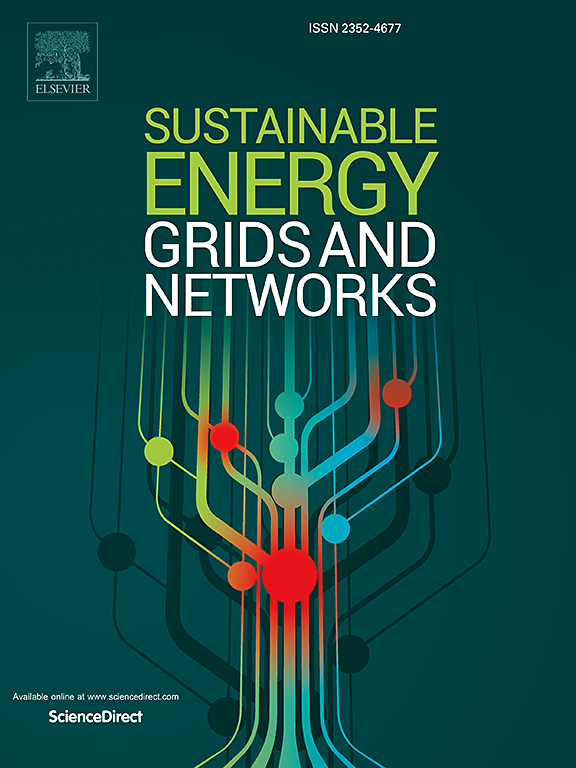电动汽车高效充电协调:共识跟踪控制方法
IF 4.8
2区 工程技术
Q2 ENERGY & FUELS
引用次数: 0
摘要
参与减缓气候变化需要解决电动汽车日益增加的使用及其与电网的整合问题。在电动汽车充电过程中,由于功率损失导致能量利用效率低下。为构建高效节能系统,支持能源可持续利用,提出了一种充电站内电动汽车有效充电协调的共识跟踪控制方法。主要目的是减少充电功率损失,有效利用充电站的可用功率。该方法包括制定电动汽车的功率偏差和设计控制增益。利用图论建立电动汽车与充电站之间的通信网络。共识跟踪算法方便了局部信息的更新、周边电动汽车和充电站之间外部信息的共享,保证了共识目标的收敛性。为了验证所提出的方法,将共识跟踪控制器应用于基于随机参数和商业模型参数的电动汽车系统。在Matlab/Simulink环境中,对该方法的基本性能进行了评估,并对其在包含三个ev的系统中的基本性能进行了评估,并对其在包含十个ev的系统中的可扩展性进行了评估。仿真结果表明,商用电动汽车模型在实现目标电动汽车荷电状态(SoC)的同时,能够有效地管理充电协调。此外,该方法降低了功率损耗,最大限度地提高了充电效率,使交流充电的功率损耗在0.18 % ~ 0.66 %之间,直流快速充电的功率损耗在6.73 %以下。此外,无论电动汽车到达和离开时间如何变化,所提出的共识跟踪方法都具有一致性的收敛性。本文章由计算机程序翻译,如有差异,请以英文原文为准。
Efficient charging coordination of electric vehicles: A consensus tracking control approach
Participating in climate change mitigation requires addressing the escalating use of electric vehicles (EVs) and their integration with the power grid. Inefficiencies in energy utilization during the EV charging process occur due to power losses. To foster an energy-efficient system and support sustainable energy resource utilization, this paper introduces a consensus tracking control method for effective EVs charging coordination in a charging station. The primary aim is to reduce charging power losses and efficiently use the available power at the charging stations. The approach involves formulating power deviations of EVs and designing control gains. Graph theory is employed to create the communication network between EVs and the charging station. The consensus tracking algorithm facilitates the updating of local information, sharing of external information among neighboring EVs and the charging station, and ensures the convergence of the consensus goals. To demonstrate the proposed method, the consensus tracking controller is applied to an EV system based on both random parameters and commercial models’ parameters. The proposed method is evaluated for its fundamental performance using a system with three EVs, and for its scalability with a system comprising ten EVs, all within the Matlab/Simulink environment. Simulation results indicate that with commercial EV models, charging coordination is effectively managed while achieving the target EVs’ state of charge (SoC). In addition, the approach reduces power losses and maximizes the charging efficiency maintaining power losses in AC charging within 0.18 %–0.66 % and below 6.73 % in DC fast charging. Furthermore, the proposed consensus tracking method consistently converges regardless of varying EVs’ arrival and departure times.
求助全文
通过发布文献求助,成功后即可免费获取论文全文。
去求助
来源期刊

Sustainable Energy Grids & Networks
Energy-Energy Engineering and Power Technology
CiteScore
7.90
自引率
13.00%
发文量
206
审稿时长
49 days
期刊介绍:
Sustainable Energy, Grids and Networks (SEGAN)is an international peer-reviewed publication for theoretical and applied research dealing with energy, information grids and power networks, including smart grids from super to micro grid scales. SEGAN welcomes papers describing fundamental advances in mathematical, statistical or computational methods with application to power and energy systems, as well as papers on applications, computation and modeling in the areas of electrical and energy systems with coupled information and communication technologies.
 求助内容:
求助内容: 应助结果提醒方式:
应助结果提醒方式:


